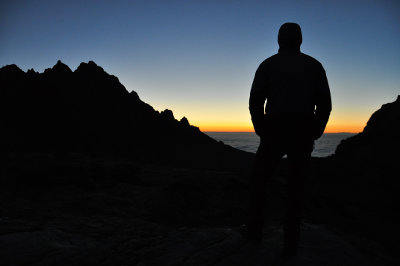They say that it’s darkest just before the dawn. Perhaps that’s physically true, but they usually don’t mean a sky without sunlight. They’re saying that rescue, recovery, revelation, or some other relief we seek comes only after – shortly after – we are stretched to our personal limits.
That was Joseph Smith’s experience in the grove, for example. Just as he felt himself on the verge of destruction, the pillar of light appeared (JS-H 1:16). We trust in our own happy outcomes too; in the end our darkness will be just that thing that happened for a while before the lights came back on.
That’s true, but it can be difficult to believe, when all we see and feel is darkness.
The thing about actual predawn darkness is that you know it’s about to end. Dawn comes like clockwork. The troubles which darken our minds and hearts are less predictable. Sometimes the light seems so faint and distant that we wonder if it’s a mirage. Sometimes we cannot see it at all, and we are left to walk by faith alone – and to wonder whether we still have, or ever had, any of that.
We speak of faith and darkness together because faith is for darkness, as coats are for the cold.
Whether the darkness which besets us is doubt, temptation, grief, addiction, pain, depression, loneliness, fear, illness, rejection, exhaustion, poverty – you know the list is longer than that – faith is our name for the thing which sees the light our eyes cannot now see. Faith sees things which are true but presently hidden (Alma 32:21). The good news is, nothing in the universe is truer than the Light we seek.
Few trials of faith find their way into history books. More are inscribed in someone’s journal. But most are written only in the lines on our faces, and we must be close to each other to see those.
When we look closely, we see that there is more faith in us than we knew. I have learned to admire the faith that keeps praying when countless prayers already seem unanswered; the faith that still loves and teaches when it doesn’t seem to be doing any good; the faith that gets up in the morning, when there is little hope that today will be better than yesterday; the faith that comes humbly to the sacrament table, week after week, year after year, when the bad habits we would break seem instead to be breaking us, and when the godly virtues we seek still hover beyond our reach (though others around us seem able to grasp them); the faith that keeps believing in and laboring to serve a loving Father in Heaven, when philosophies and events argue so relentlessly that no such being exists.
Good cheer itself is an act of faith, in times which give us cause to abandon it – and does anyone even remember times which gave no such cause? Even kindness is an act of faith, when kindness and human decency seem undervalued, and when practicing them seems to place us at a disadvantage.
On a particularly good day, our faith may resemble Nephi’s. He didn’t know the meaning of all things, he once said, but he knew that “[God] loveth his children” (1 Nephi 11:17). One can build great faith – great trust – on such a foundation, but sometimes we’re not even sure of that. Then we blame ourselves for doubting. But blaming ourselves is usually unjust.
We don’t blame the Savior for crying out, “My God, my God, why hast thou forsaken me?” (Matthew 27:46; Mark 15:34; Psalm 22:1). We know that there was purpose in his infinite aloneness. Likewise, there is purpose in our frequent inability to see the light. We are here, said Brigham Young, to learn to be righteous in the dark.
To paraphrase C. S. Lewis, the Savior never wins a greater victory than when a person looks around at a universe from which all trace of God seems to have vanished, asks why she has been forsaken, and obeys anyway. (See The Screwtape Letters, Ch. 8.)
Or believes anyway, we might say. Or hopes or serves or prays or smiles anyway. Or gets out of bed anyway.
Someday we will look back and see that, when we thought we were alone, abandoned by a vengeful or indifferent God to troubles which were tearing us apart, the Father and Son in fact were always there, protecting us, holding us together, and guiding us homeward, step by faltering step.
Therefore, in darkness we walk by faith. We move toward the light we remember or the light we hope is there, clinging to God’s promises: “Mine angels [will be] round about you, to bear you up” (D&C 84:88). “Fear thou not; for I am with thee: . . . I will strengthen thee, yea, I will help thee” (Isaiah 41:10).
When the darkness seems endless, and we feel that he must have meant someone else when he made those promises – perhaps another branch of the family, or maybe the neighbors? – when memory fails us, becoming unreliable or seeming unreal; when pain or sorrow or guilt or exhaustion overwhelms our hope – still we crawl toward the light our faith tells us must be there.
Because the faith we no longer detect in ourselves is not so easily quenched. There is more faith in us than we know.
Because he has placed a spark of himself in us, and light seeks greater light. Light seeks him.
Because he himself, the Light, is always there, more certain than the dawn.
Because he said, “[I will] not forget thee. . . . I have graven thee upon the palms of my hands” (Isaiah 49:16; 1 Nephi 21:16).”
Because even through our deepest darkness, the Light we cannot see will see us safely home.
I wrote this for my congregation’s January newsletter.





